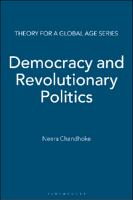Democracy and Revolutionary Politics
Abstract
This book is available as open access through the Bloomsbury Open Access programme and is available on www.bloomsburycollections.com. Democracy and political violence can hardly be considered conceptual siblings, at least at first sight. Democracy allows people to route their aspirations, demands, and expectations of the state through peaceful methods; violence works outside these prescribed and institutionalized channels in public spaces, in the streets, in the forests and in inhospitable terrains. But can committed democrats afford to ignore the fact that violence has become a routine way of doing politics in countries such as India? By exploring the concept of political violence from the perspective of critical political theory, Neera Chandhoke investigates its nature, justification and contradictions. She uses the case study of Maoist revolutionaries in India to globalize and relocate the debate alongside questions of social injustice, exploitation, oppression and imperfect democracies. As such, this is an important and much-needed contribution to the dialogue surrounding revolutionary violence.
Keywords
Social and political philosophy; Marxism and Communism; Political structures: democracyDOI
10.5040/9781474224048ISBN
9781474224031, 9781474224024, 9781474224031Publisher
Bloomsbury AcademicPublisher website
https://www.bloomsbury.com/academic/Publication date and place
London, 2015Imprint
Bloomsbury AcademicSeries
Theory for a Global Age Series,Classification
Political science and theory
Social and political philosophy


 Download
Download